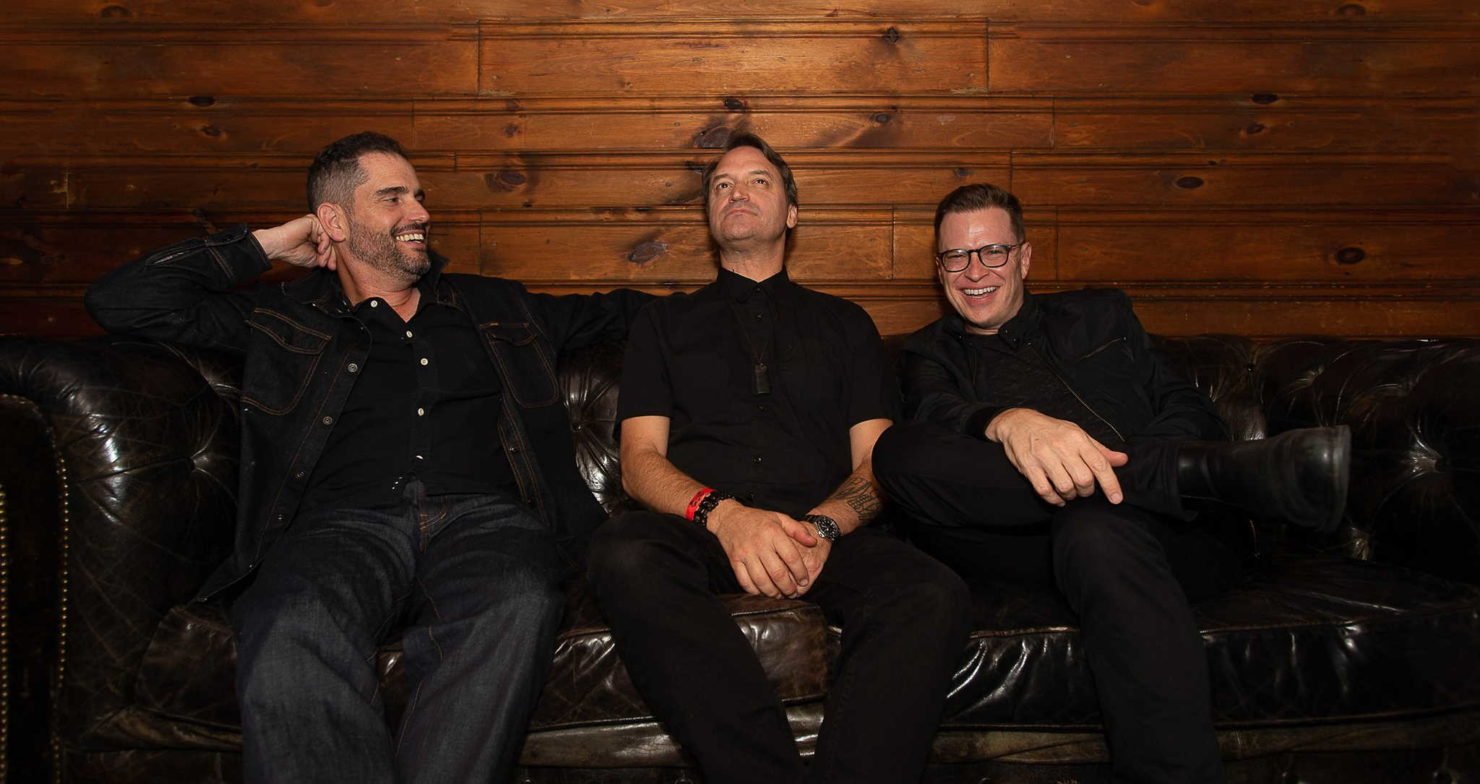Swing Time: Garage A Trois

In this car, there’s no emergency brake— there’s not even a regular brake. There’s no neutral. When you turn on the engine, it just starts going at full speed. It comes from the factory in drive, pedal to the metal.”
If that quote sounds more like the description of a winning vehicle at the Indy 500 than a portrait of an improv-leaning indie outfit, then it might help to consider the context. The subject, after all, is an entity called Garage A Trois, and the excited musician spouting that string of automotive metaphors is one of its members, the mono[1]monikered Skerik, who plays keyboards and saxophone— often simultaneously. Skerik recently reunited with drummer Stanton Moore, best known for his work with Galactic, and Charlie Hunter, who simultaneously plays both the guitar and the bass on the same instrument (more about that in a minute). Their new album, Calm Down Cologne—we’ll get to that title in a sec, too—is their first as a trio since the three ultra-prolific players cut their debut EP, Mysteryfunk, back in 1999.
Calm Down Cologne—which consists of five mostly instrumental, industrial[1]strength jams totaling just 35 minutes—wasn’t the result of some great planning session. One day in early 2019, the three musicians happened to be playing a gig at Seattle’s Nectar Lounge, commemorating the 20th anniversary of their actual first recording together, Moore’s 1998 solo debut, All Kooked Out. Pearl Jam guitarist Stone Gossard’s Studio Litho happened to sit across the street from the venue; Skerik is friends with the grunge pioneer and suggested that they duck into the space for a bit.
“Skerik arranged for us to have the studio and for a killer engineer, Randall Dunn, to be there,” Moore recalls. “We literally picked the drums up off the [Nectar] stage, carried them over there—cymbals still on the stands—and made the record in several hours. Then, we picked the drums up, carried them back across the street—cymbals and snare still on their stands—and put them back on the stage. Then, we played the gig.”
“It was just a matter of our respective orbits aligning, more or less,” Hunter says. “Our intention for the recording was just to flow in the same way that we do at a gig and see what happens. There was no discussion at all. We just played—simple as that.”
What you hear on Calm Down Cologne—which was released on the Royal Potato Family label in April—is almost exactly what went down that day. All of it was improvised on the spot in the studio, with the exception of the title track, which was framed out in advance by Skerik. The only overdubs on the album are a vocal part by Christa Wells on the track “The Epic,” and a second guitar line that Hunter added to another tune.
Garage A Trois’ on-the-fly approach helped the ensemble make inroads on both the jam and jazz circuits early on. In 2000, they even scored an opening spot for fellow improv-friendly supergroup Oysterheads’s high-profile first show.
“It’s very natural making music with these guys,” Moore says. “Charlie will start playing something, and we’ll fall in with him. Then, the next thing that he plays is completely different than what he just played. There’s a wide array of feels or attitudes or moods.”
“I guess with the earlier records, there was more thought beforehand and questions like, ‘Should we do this, or what about this? Should we play this song?’” Skerik says. “But Charlie was pretty adamant about not doing that on this particular record. He said, ‘I don’t want to do any songs. I want to go in there and groove and see what happens and just improvise.’”
However, that casual attitude doesn’t mean that what they do is simple. Hunter’s axe of choice, a “dual[1]output” Hybrid Big 6, allows him to play both the guitar and bass parts on a single instrument—and mimic other sounds altogether. “Charlie covers the bass and the harmonic duties, sometimes sounding like a guitar, sometimes sounding like an organ, sometimes sounding like something else,” Moore says. “It sounds like at least two people—and sometimes even three—at one time. It’s the opposite of challenging playing with him because he’s covering so much ground, and it’s coming from one source. It’s all a unified approach.”
Skerik, meanwhile, calls what he does “saxophonics,” which he describes as “saxophone implementing effects and extra sounds.” He adds that, for Calm Down Cologne, “We had my saxophone set up through a pretty simple effects rig and then I had three different keyboards in there. I was trying to play little melodies on top of what those guys were doing and trying to stay out of the way. The keyboard and sax were playing simultaneously, and it was all improvised and tracked live. But I don’t consider it a special skill or anything. It’s much easier than what Charlie does.”
With the recording finished, the trio thought long and hard about what to call it. But, of course, the title ended up coming to them with the same lack of fuss that the music did. Skerik tells the brief tale: “An artist friend of mine was telling me a story one night about how a bouncer he knew had to use some ‘calm down cologne’ on an unruly patron. I told the guys in the band and everyone thought it was really funny.” Depending on how things unfold over the next few months, the three musicians hope to regroup for some live shows. “Even though we don’t play all the time together, we keep in contact and are still good friends,” Moore says. “It just felt very natural to do this, like a homecoming.




















